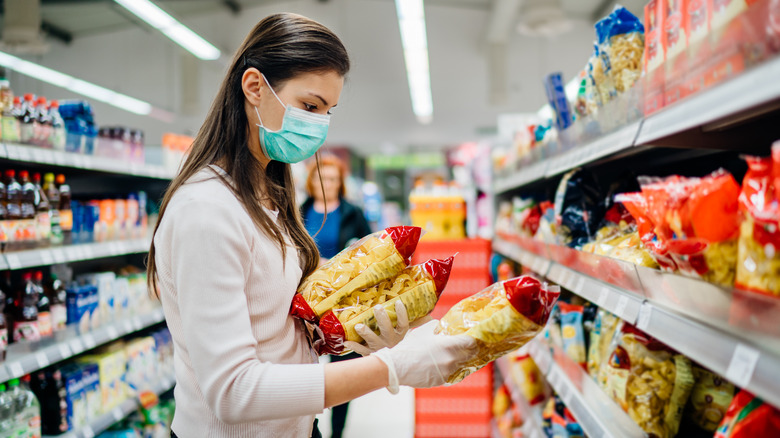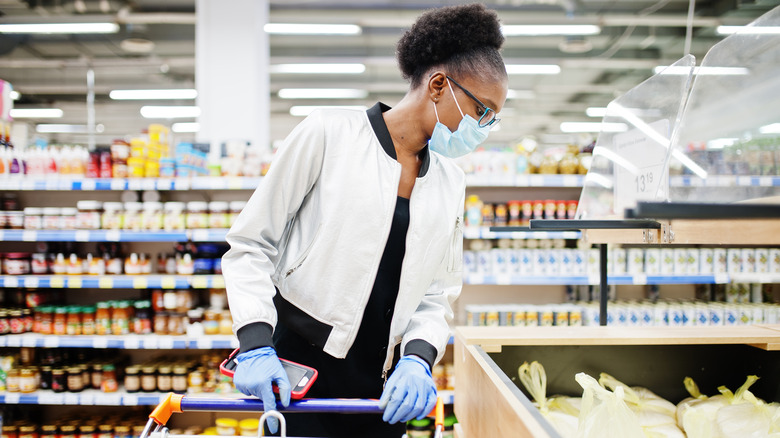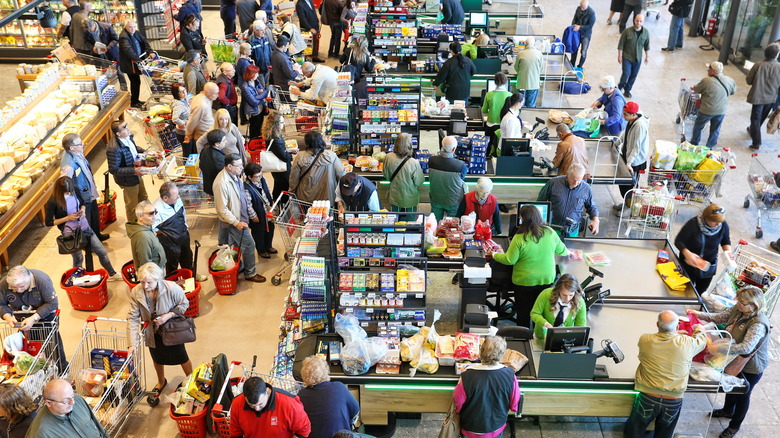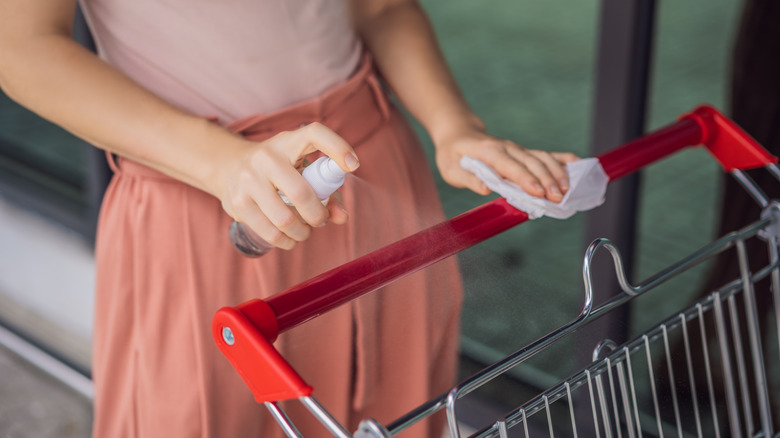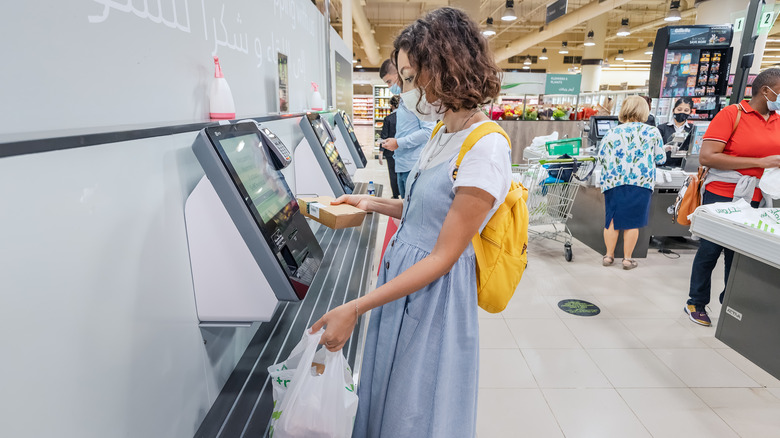Red Flags A Grocery Store Isn't Following COVID Guidelines
If any industry's been hit hard since March 2020, it's your local grocery store. In spring 2021, the United Food and Commercial Workers documented that at least 35,100 grocery store employees contracted or were exposed to COVID-19. The labor union, which operates in both the U.S. and Canada, also took a survey among frontline workers earlier this month: Nearly half of respondents who got the virus guessed they contracted COVID-19 at work (via YouTube).
In short, staying COVID-safe in a grocery store is vital — not only for the consumer, but for the staff, a group that's been deemed high-risk by the Centers for Disease Control and Prevention. Luckily, the Food and Drug Administration has confirmed no evidence of COVID-19 transmission through food. Your food may be safe, but airborne transmission remains a threat. There are various safety measures a shopper can take to mitigate transmission and some easy-to-spot red flags that a store might not be taking adequate safety precautions.
There's no mask requirement
As the virus evolves, it can be tricky to keep up with the latest safety guidelines. Should you shop maskless if you're fully vaccinated? Does the delta variant mean you should go back to wearing one? It's complicated. As vaccination rates shot up this year, major grocery stores — like Walmart and Kroger — began allowing fully vaccinated customers to shop without a mask in states where it's permitted (via AARP). But basic science from the CDC shows that a grocery store with no masking can increase your risk of catching the virus.
Many stores, including Costco, are strongly encouraging masks among shoppers, though not explicitly requiring them except in locations where it's mandated, per the company website. But that's not the case everywhere. In several Bay Area counties, indoor masking is still required among everyone (via CBS SF). As the highly transmissible delta variant continues to spread, the CDC once again recommends masking up indoors if your county is experiencing substantial or high COVID-19 transmission. (You can find your county's transmission level on the CDC website.) With those guidelines in mind, opting for a grocery store where masks are required can lessen your chances of infection.
It's too crowded to social distance
COVID-19, as we now know, spreads through the air via particles and droplets, as the Environmental Protection Agency explains. Crowded indoor settings, therefore, hold a greater risk of virus transmission. The more people, the more potential that some COVID-infested particle will find its way to you. The CDC still encourages social distancing indoors and adds that you should limit how much time you're spending in these settings. Therefore, a crowded grocery store will increase your chances of COVID-19 infection, per the CDC.
A crowded grocery store will likely force you to spend more time shopping, waiting in line, and weaving through busy aisles. And with a supply chain crisis on the horizon, the last thing you need to be doing is wrestling your fellow shopper for the last pack of toilet paper. Try avoiding your favorite store during its peak hours — and thanks to this life hack from The Kitchn, you can check a store's busiest hours using Google Maps.
There's no regular cleaning
Carrying hand sanitizer is always a plus — it can literally kill viruses, and serves as an easy on-the-go alternative to hand washing (via Medical News Today). However, catching COVID-19 from grocery store surfaces — like the handle of a shopping cart — is relatively low if precautions are being followed. That's according to an Ontario-based study in the journal Current Research in Food Science. In the study, researchers from the University of Guelph tested for COVID-19 on surfaces like plexiglass, conveyor belts, and credit card readers. Out of 957 tests, none came back positive. Still, the study stresses that it's necessary for store employees to clean surfaces adequately and regularly — another component to look out for the next time you shop (via HealthDay).
And as Dr. Akua Woolbright of the Whole Cities Foundation tells Everyday Health, scrubbing surfaces isn't necessary for COVID-19 prevention — but it's definitely not a bad habit to clean your produce.
No options for self-checkout
Remember when we said COVID-19 is transmitted through airborne droplets? Heading to the self-checkout aisle can mitigate COVID-19 transmission. Avoiding in-person checkout trims down the number of your interactions at the grocery store. In other words, it decreases the risk that you'll transmit COVID-19 to a staff member — or vice versa — especially if not everyone is wearing masks (via Eat This, Not That).
And this option has been popping up in more grocery stores as the pandemic drags on. Wawa, for example, added more kiosks to its locations "to provide a more socially distanced checkout option," a spokesperson told Philly Voice. And Whole Foods is working on two new stores that will allow shoppers to sign up for a "virtual cart" — allowing customers to pay through their phone and skip the cashier altogether, according to USA Today. The new normal of automated checkout options certainly has its downsides: The widespread shift toward computerized shopping could lead to a decline in retail jobs (via The New York Times). But if the self-checkout option exists in the COVID era, it could make your shopping experience just a little bit safer.
